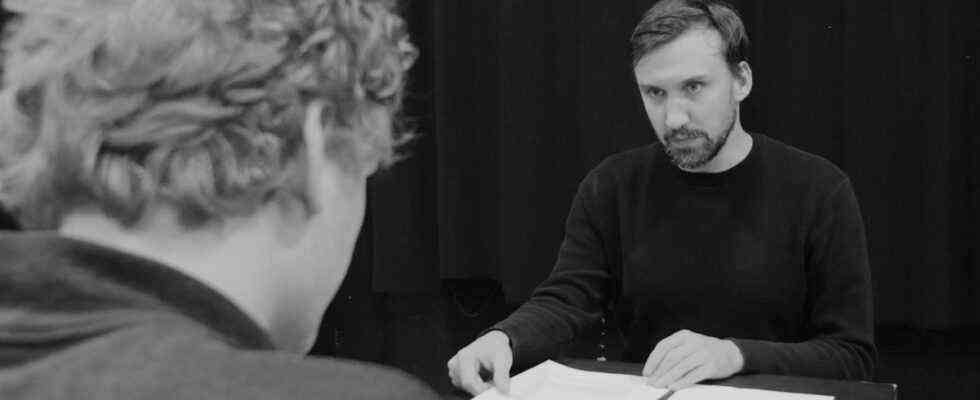One thing was clear to Sebastian Baumgarten: If you deal with Heiner Kipphardt’s play “Bruder Eichmann” today, then you can’t just stage it as it was back then, in 1983, at the premiere, a few months after the author’s death. Then you have to feel your way. And Baumgarten turns it into a stream production. Now you are back in the same place, in the Residenztheater, where Dieter Giesing staged and Hans-Michael Rehberg played Adolf Eichmann. But what happens now is a search for traces, an appropriation, an approach. That’s why Johannes Schütz, who was the set designer at the time, first reported in the stream about the problems with the set design at that time, which is why Baumgarten also included a few excerpts from the rehearsals in 1983.
After the live presentation in the Marstall you have to say: It works much better on the Internet
With this production, the Residenztheater begins building a Online media library. During the two lockdowns, the house produced a lot for the network and stuck to it when gaming was more or less possible again. That should not be lost and is presented little by little on the homepage. Readings will be among them, as well as performances that have been created for the internet. And with “Bruder Eichmann” there is also fresh goods. One thing can be said after its live presentation in the Marstall: It works much better on the Internet.
It’s actually not that live at all, ultimately the audience meets to watch the stream together. But first of all, you go on a course with an iPad, on which you learn at various stations about the attempt to reconstruct Eichmann’s escape. In the Marstall this is a process that connects the audience to each other in overcoming technical problems, afterwards, at home in front of the computer, it works smoothly, but still has a certain sorrow. At the end of the war, Eichmann went into hiding, but was arrested, not recognized, changed his identity several times, escaped, lived in Austria, Germany and Switzerland, and finally fled to Argentina with the help of the Vatican, the Red Cross, former like-minded people and the Argentine government, where he was discovered by the Mossad after ten years and brought to Israel for the trial. You can follow these winding paths on Google maps, Google Street View shows some of the places today, the commentary is in Austrian, Swiss German (although Eichmann was in Geneva, where hardly anyone speaks Swiss German) and unsubtitled in Spanish. This is nothing more than a tinkering.
Much more exciting is the main piece, Sebastian Baumgarten’s arrangement of Kipphardt’s text for the net. You can see them on screens in the stables, but it’s better to look at them on the computer at home. Eichmann, head of the “Department for Jewish Affairs” in the Reich Security Main Office from 1939 to 1945, was the planning strategist for the extermination of the Jews. In 1962, after a long trial, he was executed in Israel; five years later, Kipphardt began working on his play. At that time the Federal Republic was a different one, with former Nazis sitting in control of the state. The anger about it pervades, sometimes very crude, the text that Kipphardt left lying for a long time and completed in 1982.
For Kipphardt, the matter was clear: In essence, it is about the willingness to function within the framework of a given order without moral concerns. Brother Eichmann could be anyone who simply obeyed and wanted to function in an inhuman system, so Kipphardt referred to Hannah Arendt and her famous trial report on the “banality of evil”. He sifted through thousands of pages of trial files and used them to build long conversations between Eichmann and police captain Leo Chass, who was interrogating him, inserting analogies in a somewhat problematic furor – the pilots who dropped the atomic bomb on Nagasaki, for example, had only carried out orders.
Baumgarten, thank God, omits these analogies, they would make it even more difficult to approach. You can see Thomas Lettow (Chass) and Johannes Nussbaum (Eichmann) in conversation, on a rehearsal stage, in the recording studio. Neither of the two embodies his figure, sometimes they just read the text. They are not substitutes, they are actors in a process of visualization that takes place on different time levels, in the war, 1962, 1967, 1982, today. Always viewed from today.
It is fascinating to experience how Nussbaum lets this Eichmann as an informative perpetrator, who never sees himself as a perpetrator, become plastic as a phenotype of functioning without any adaptation. Kipphardt experts on the other hand seem useless, guest appearances from the ensemble – prison director, lawyer (terrifying: Lukas Rüppel) and Carolin Conrad, who is irritably sexy illuminated in this context as a psychologist – are enlightening. You can see a lot of original documents, a touch of historicity wafts across the screen. But Nussbaum scares them away. It’s a tough job, ultimately imperative.

